Blog Experts Convene in Rome for The Role of Technology Transfer in AgriTech Event
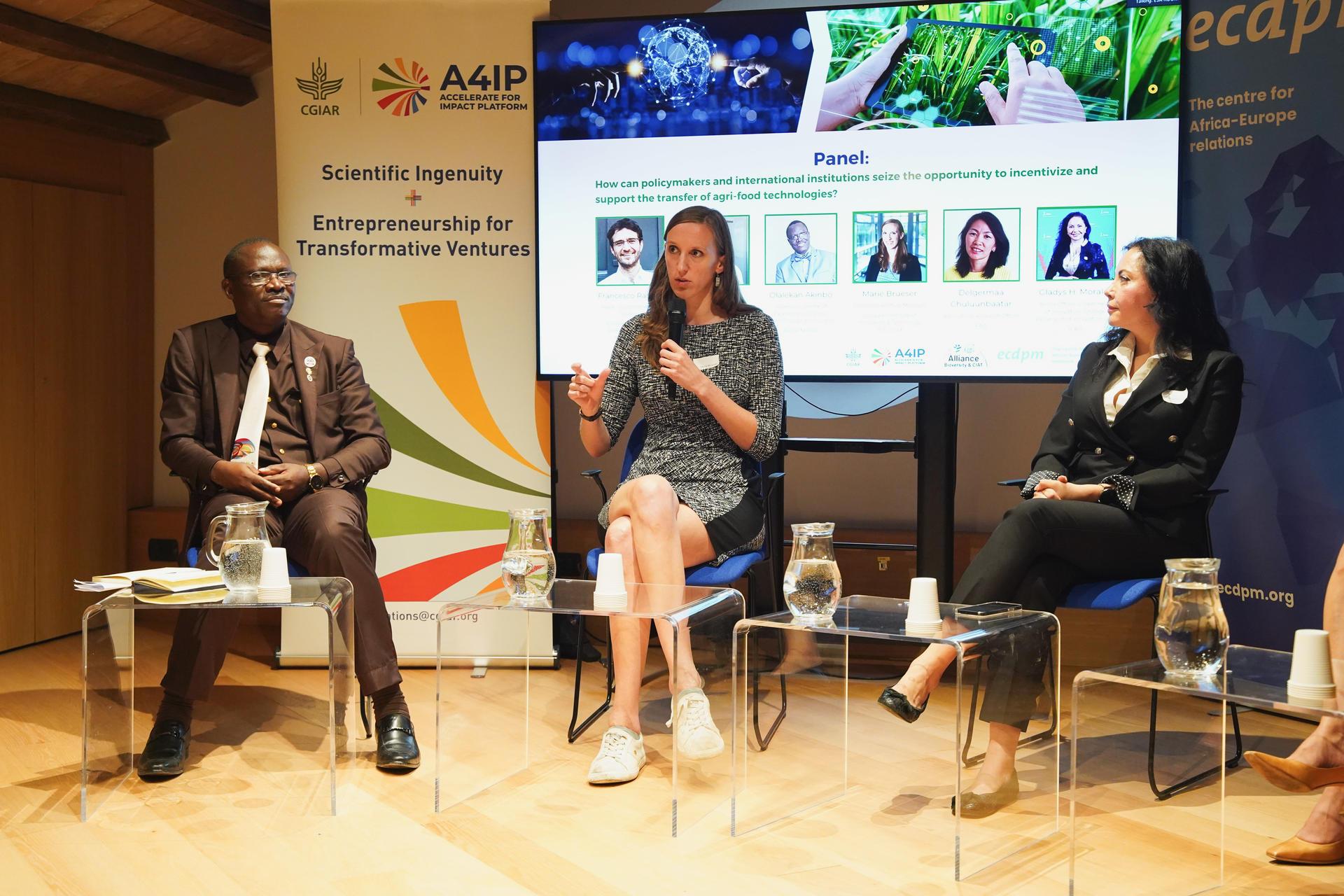
On World Food Day, representatives from impact-driven organizations gathered to discuss mechanisms and conditions to empower young talented entrepreneurs and accelerate the development and funding of Agritech solutions.
On Monday 16 October 2023, the CGIAR Accelerate for Impact Platform, European Centre for Development Policy Management (ECDPM), and LVenture Group assembled representatives from institutions at the forefront of innovation for impact at the event, “Developing and Deploying Agri-Food and Climate-Tech Innovations: The Role of Technology Transfer.”
Esteemed policymakers, industry experts, scientists, investors, as well as academia and private sector representatives came together for World Food Day at the headquarters of the Alliance of Bioversity International and CIAT in Rome – a CGIAR research center and home of the Accelerate for Impact Platform to discuss the role of technology transfer in the agritech space through a packed program of keynote addresses, success stories, and panel discussions. Many also joined the conversation virtually from across the globe – the live session boasting online participants from across all six of CGIAR’s regions: LAC, CWANA, WCA, ESA, SA, and SEA.
Watch the recording on the Accelerate for Impact Platform YouTube channel
Kicking things off, Dr. Javier Mateo-Vega [Global Director Partnerships & Communication, the Alliance of Bioversity International & CIAT; Senior Director, Partnerships Intelligence, CGIAR] set the scene with his opening remarks. Dr. Mateo-Vega emphasized that scientists’ toolboxes are already brimming with fantastic opportunities for impactful change, citing technologies like robotics, nanotechnology, AI, machine learning, the Internet of Things, and remote sensing: at the Alliance, for instance, AI-driven advancements like Melisa, Tumaini, and the Artemis Project hold the potential for revolutionizing agriculture. However, to materialize the potential impact, as Dr. Mateo-Vega expressed, it will be imperative to co-create solutions with end-users, especially in the Global South, and incentivize mechanisms by which these technologies can be bridged out of the lab and conceptual phases where they often remain trapped.
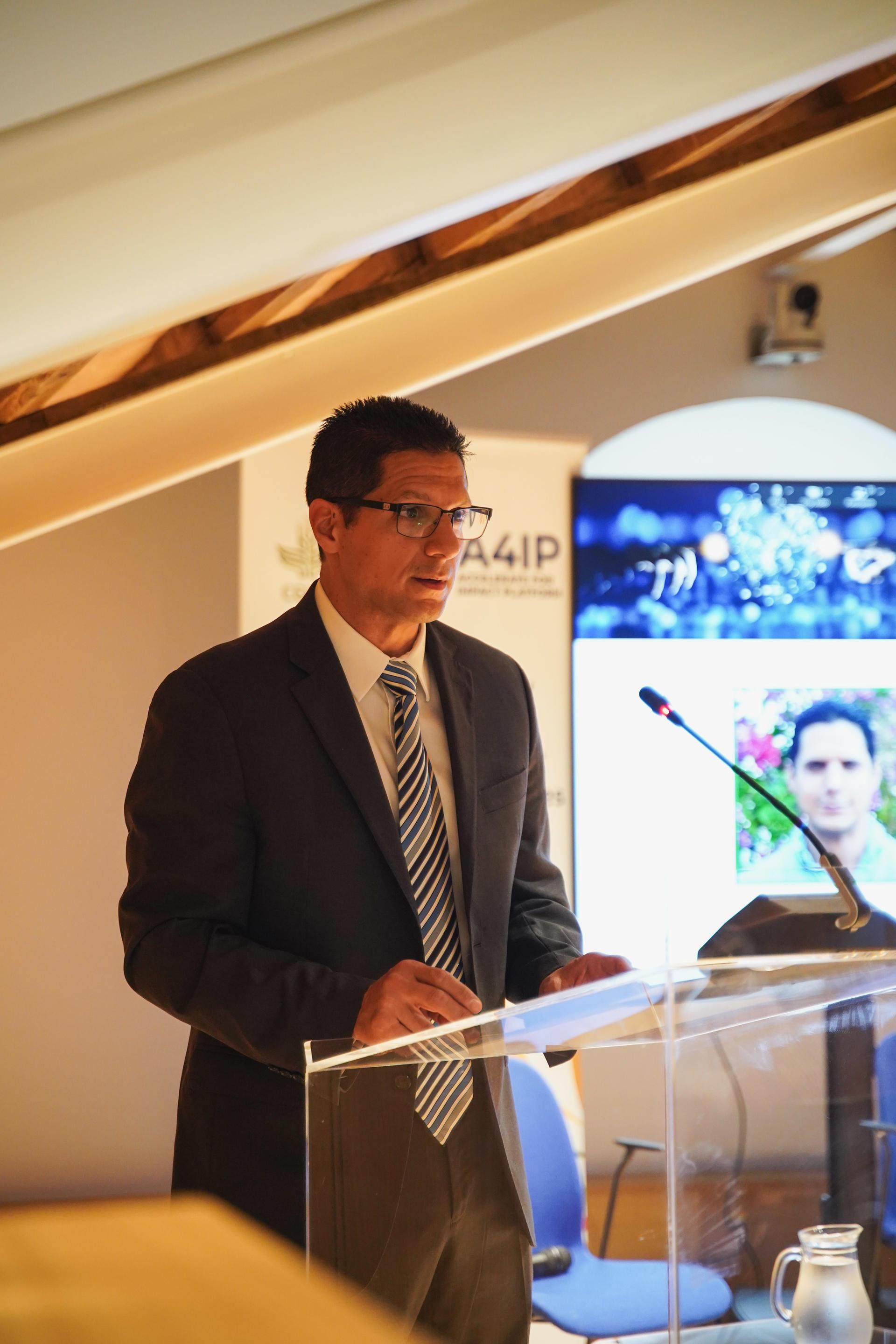
Next, Mark Mann [Managing Director, Mark Mann OÜ and Co-Founder, Divine Ox] offered the first of two keynote addresses. Mann explored innovative approaches to knowledge transfer, elaborating from experience in social enterprise on how tech transfer mechanisms have enabled spinouts to work together with policymakers to address public-sector market failures. These models around social ventures offer the opportunity to leverage collaboration to garner large-scale translational funding. Urging stakeholders to prioritize impact above all else, Mann emphasized that targeted translational funding is critical to bridging the gap between research and such impact. He advocated for the adoption of a project-driven approach to innovation, stressing that researchers' passions, motivations, and project objectives should guide transfer strategy.
Hangyul Song [Research and Data Associate, Briter Bridges] provided the second keynote speech, discussing the importance of tech transfer as a growth tool for innovators and the need for collaborative efforts to support this growth, particularly through public-private partnerships. Song highlighted the value in the bundling of products and the importance of localization in tech transfer, for end-users and innovators, and ultimately for society at large.
Over the course of two panel discussions, esteemed speakers delved deeper into the world of tech transfer, exploring first the opportunities for agri-food and climate-tech innovation, and second the enabling conditions through which to harness its potential for international cooperation and development.
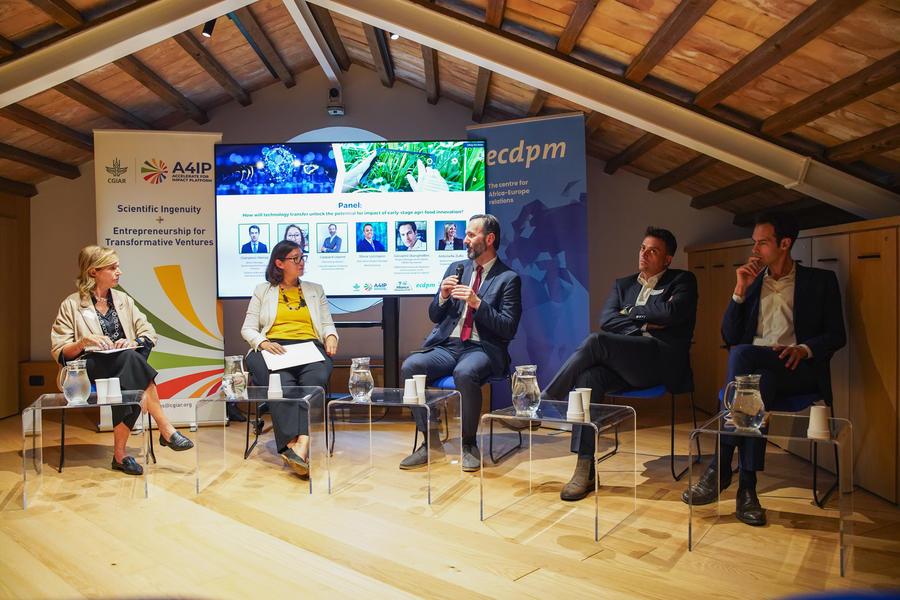
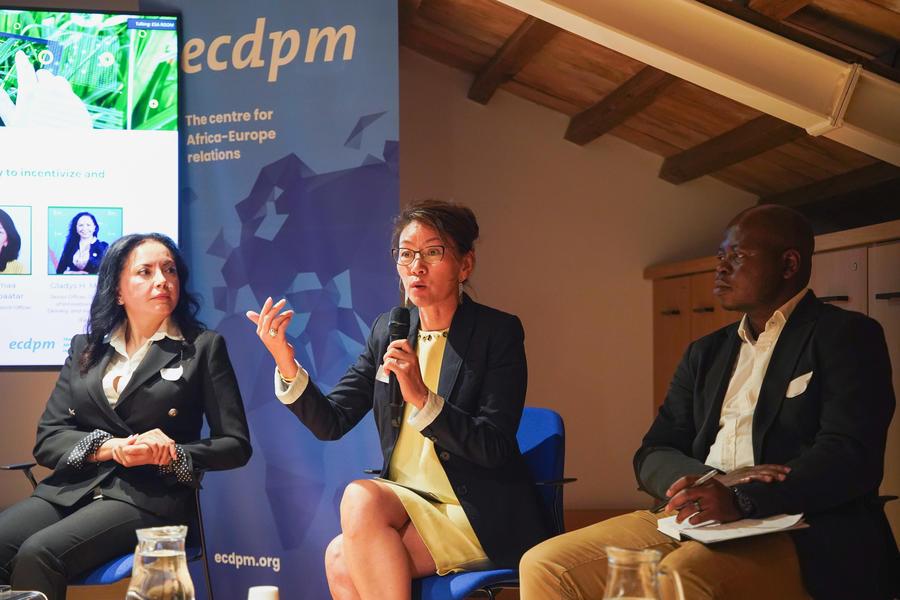
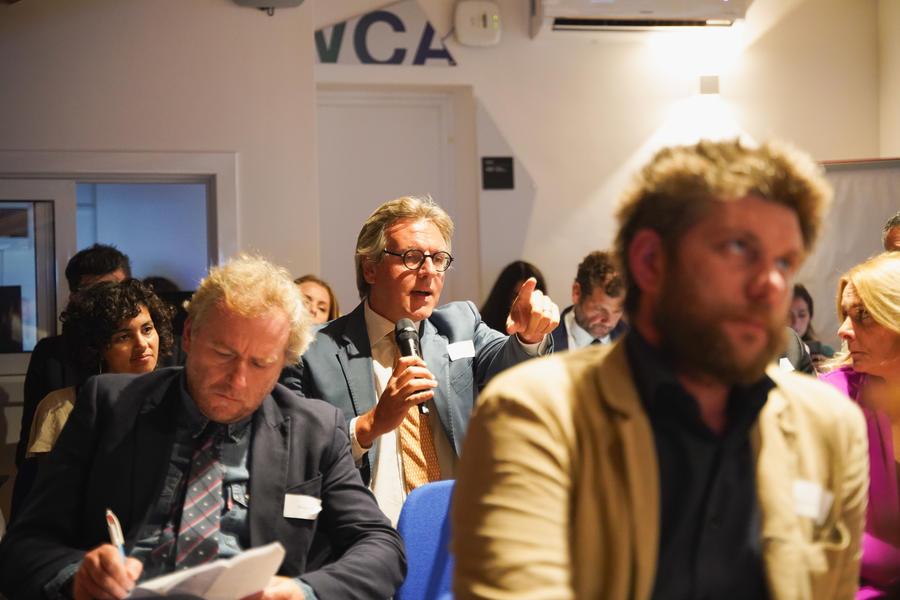

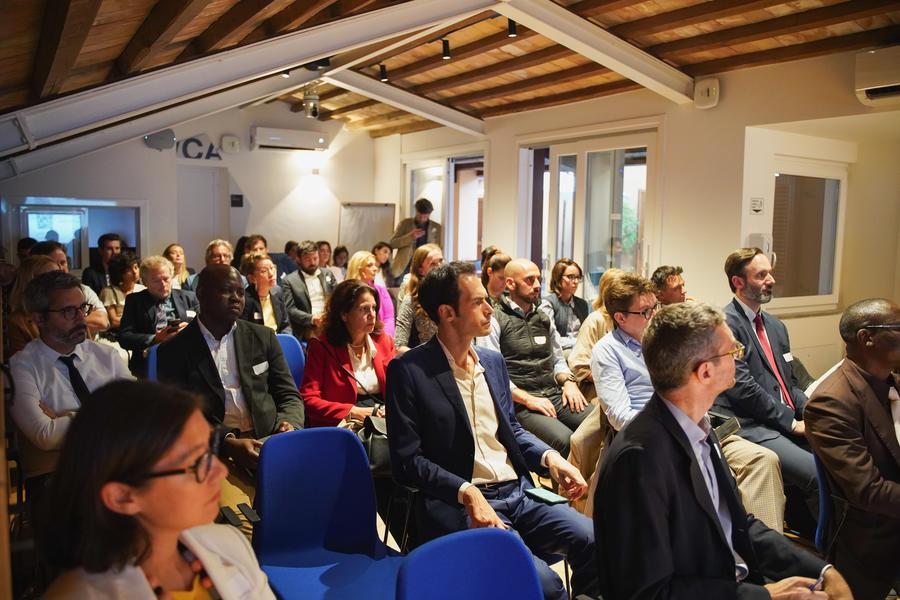
A number of key takeaways emerged:
- The linkages, support, and frameworks required to facilitate the development, deployment, and adoption of innovative technologies are largely lacking, often leaving potentially game-changing innovations stuck at the pre-commercial phase.
- The journey from idea to impact is hindered by insufficient technology transfer expertise, yet concerted international cooperation can serve to ensure that effective mechanisms are available on both the local and global scale.
- A rethinking of technology transfer is especially imperative in the context of the Global South, where the effects of climate change are often most immediate, and resource and technological disparities persist. We must move beyond capacity-building to capacity-sharing. Co-creation with end-users, particularly smallholder farmers, is vital for delivering market-driven products that can meet local needs and craft tailored and accessible solutions. By sharing capacities through inclusive collaboration, we harness a human-centric approach to the development of more equitable food systems.
- Collaboration and multi-stakeholder partnerships are essential to scale and maximise impact of innovative solutions to food insecurity and climate change. Close international cooperation will allow for the pooling of expertise and resources, accelerating the development of innovative technologies, and ensuring they reach those in need.
- Comprehensive policy and legislative frameworks that regulate and incentivise technology transfer within agriculture and food systems will be pivotal to achieving required system changes. Transparent, collaborative, and harmonized policies among stakeholders are essential to the effective sharing and distribution of knowledge and technology.
The insights gained from this event underscore the immense potential of technology transfer in revolutionizing agriculture and addressing climate challenges. Scientists, innovators, policymakers and all associated stakeholders must now rise to the occasion by harnessing transfer mechanisms to create more equitable, resilient and sustainable food systems, and ultimately, deliver global food security.
More on the Accelerate for Impact Platform (A4IP)
The Accelerate for Impact Platform (A4IP) is the venture space that leverages CGIAR’s legacy in research and innovation to co-design, accelerate, and de-risk investments in technologies for sustainable agriculture and climate action. A4IP explores innovative partnership models to bridge research products from lab to market, create demand for CGIAR science, and strengthen its role in the innovation ecosystem. The initiative plays a catalytic role for entrepreneurial scientists, startups, and other strategic partners driving innovation that will make our agri-food systems healthier, more equitable, and more sustainable. A4IP is an initiative powered by the Alliance of Bioversity International and CIAT; a CGIAR research center.
Learn more here
Connect with us on LinkedIn
Reach out at [email protected]
